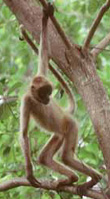|

The
Spider Monkey is pot - bellied, spider - limbed, worried - faced and
independent. They have very long legs and tails and are extremely agile.
In the tropical rainforest of Colombia, Ecuador, Peru and Brazil, they
live in communities that can break into sub-groups of 3-4 individuals.
Spider monkeys live in trees up to 35 metres above the ground. Probably
only gibbons exceed spider monkeys in agility in the trees. Acrobatic
and swift, spider monkeys move through the trees, with one arm stride
covering up to 12 metres. They have a prehensile tail, which acts as a
fifth limb, able to grasp objects or hold their entire body weight for
long periods.
They eat fruit, nuts, seeds or leaves but they will take insects or small
animals if they are readily available. Maturity is reached at around four
years, with females coming into season every four weeks. Gestation is
7-8 months. Newborns cling to their mothers' abdomen and then travel on
her back until independence. The average life span for a Spider monkey
is around 20 years. They are closely related to the other monkeys in the
family cebidae, including capuchins and howler monkeys.
They have been known to shake a vine occupied by a predator to cause them
to fall. They have also been seen breaking off dead branches weighing
nearly 5kg and dropping them on the predator.
Reasons for their decline include hunting for food by locals, the use
of infants as pets, and habitat loss due to clearing of forests for agriculture
and human habitation. They are vulnerable because they have low maturation
and reproduction rates. Their habitat, mature rain forests, is being lost
to farming at the rate of 35,000 acres a day. Preserving the rainforest
in South America will help save them from extinction.
|
 The Spider Monkey - Issue One
The Spider Monkey - Issue One